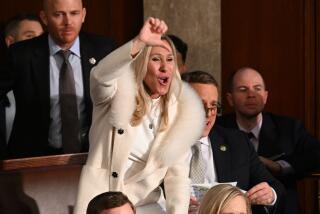Gingrich Persona non Grata in Party He Once Dominated
- Share via
WASHINGTON — Some House Republicans recently were preparing for a reunion of their fabled class of 1994, the conservative vanguard that former Rep. Newt Gingrich (R-Ga.) helped sweep to power five years ago, when a question occurred: Should they invite Gingrich? In a show of hands, almost everyone said no.
“A majority did not want to have anything to do with Newt,” said Rep. Ray LaHood (R-Ill.), one of the few who wanted to invite the former speaker to the November event.
Faced with a similar situation in which some Republicans had qualms about inviting him to a January celebration of GOP power in Congress, Gingrich wrote to the Capitol Hill newspaper Roll Call, saying that he would not attend, even if asked.
It has been about a year since Gingrich resigned the speakership and left the House. Getting the cold shoulder from his one-time acolytes is a rude reminder of how fast the mighty can fall from grace in the nation’s capital.
Once a political colossus who dominated Washington, Gingrich now has little to do with the Capitol he ruled for four years. He is embroiled in a messy divorce. Even allies are furious about reports--now acknowledged--that he was conducting an extramarital relationship with a congressional aide, apparently as the GOP was attacking President Clinton for dallying with a White House intern.
Still, it is a sign of Gingrich’s resilience that, despite his personal and political setbacks, he has amassed all the trappings of fin de siecle celebrity and influence.
He is in great demand on the lecture circuit, pulling in as much as $50,000 a speech. He still has a political action committee. He has his own consulting firm and Web site (https://www.newt.org), a visiting fellowship at Stanford University and an office at a Washington think tank.
What’s more, some analysts say Gingrich’s departure may have rid the party leadership of their most controversial figure, but it cost them one of their most important strategists.
“Republicans lost something when Mr. Gingrich left,” Everett Carl Ladd, a political scientist at the University of Connecticut, wrote recently in the Wall Street Journal. “He provided something that’s often lacking in American politics: a start at linking the various strands of a party’s current proposals, first to one another and then to fundamental national values.”
It was a year ago last month that Gingrich, following heavy GOP losses in the 1998 elections, abruptly announced that he would leave the speaker’s office and the House. It was the end of a tumultuous congressional career that climaxed with the 1994 elections, when Republicans won control of Congress for the first time in 40 years. Gingrich got the lion’s share of credit because he shaped the congressional campaign strategy that centered on a national GOP platform, the “contract with America.”
His speakership was a roller-coaster ride of controversy: a budget face-off with Clinton that shut down the government, a protracted ethics investigation, an unsuccessful attempt to depose him by a GOP cabal. Through it all, Republicans stuck with Gingrich because many believed that they owed their power in Congress to him and because no one was his match as a strategist. But when the 1998 elections unexpectedly whittled Republicans’ House majority to a mere six seats, Gingrich came under heavy internal fire and resigned.
Life without the vast powers of the speaker’s office took some getting used to, but his friends say that Gingrich seems remarkably happy, even liberated by not having so much attention paid to every word he utters.
“Any change in life experience at the age of 55 is not going to be an overnight process,” said Mike Shields, Gingrich’s spokesman. “But I was at his house the day he decided to step down. He was already thinking about the future.”
Gingrich has kept a low profile on things congressional, trying to give his former colleagues room to run things on their own.
In place of power, he has constructed a multifaceted niche for himself. He is a senior fellow at the American Enterprise Institute, a conservative think tank where he is pondering ways to remake the health care system. He is mulling technology issues at Stanford’s Hoover Institution. And he has turned political pundit, landing a gig as a commentator on Fox Television.
He has several Web sites touting his policy causes: cutting estate taxes, reducing the overall tax burden and revamping Social Security to provide personal retirement accounts. And for the first time in his life, he is making some serious money. He has given about three dozen speeches so far this year for as much as $50,000 each.
It all would look like a tranquil life--more money, more peace and quiet--if not for the turmoil in his personal life. In July, he filed for divorce from his second wife, Marianne, saying that their marriage was “irretrievably broken.” His wife is fighting him in court, making an aggressive effort to uncover the details of Gingrich’s relationship with Callista Bisek, a 33-year-old aide to the House Agriculture Committee.
Randy Evans, one of Gingrich’s lawyers, acknowledges that Gingrich has had a romantic relationship with Bisek since 1993--more than a year before he became speaker. Marianne Gingrich’s lawyers will take a deposition from Bisek later this month. They have demanded that Gingrich answer in writing dozens of questions about his finances and extramarital love life, including one asking if his behavior was consistent with the “family values” he espoused in public life.
Rep. Christopher Shays (R-Conn.), for one, does not think so--especially since Gingrich led the GOP in its 1998 drive to impeach Clinton on charges connected with his affair with Monica S. Lewinsky.
“It struck me as a pretty reckless thing,” Shays said. Gingrich “was pretty high-profile in attacking the president and preaching family values. I was happy he wasn’t my speaker [any more] and I didn’t have to explain that one to my constituents.”
Gingrich has refused to be interviewed about the divorce and could not be reached for comment. But in a recent appearance on Fox News, he responded to suggestions that his criticism of Clinton was hypocritical. He pointed out that his critique of Clinton focused not on his private behavior with Lewinsky but on the fact that the president broke the law by lying to a grand jury.
“I was very specific about what I thought was at stake, which was in fact not his personal life but what happened in terms of the rule of law,” Gingrich said.
The bitter divorce proceedings were one reason some Republicans had concerns about inviting Gingrich to the 1994 class reunion, according to LaHood. Then in November, Roll Call reported that some Republicans also did not want Gingrich at a January event being planned to mark the fifth anniversary of Republicans’ takeover of Congress. In response, Gingrich wrote a letter, published in today’s edition of Roll Call, saying that it would not be appropriate for him to attend even if asked, because “a January 2000 event is about the next election and not really about the past.”
Gingrich said he was “amused” by the controversy because it was exactly the kind of distraction he hoped to spare the GOP when he left the House. Wrote Gingrich: “One of the purposes of my stepping down after the 1998 elections was to eliminate the excuse of focusing on me rather than the issues.”
More to Read
Get the L.A. Times Politics newsletter
Deeply reported insights into legislation, politics and policy from Sacramento, Washington and beyond. In your inbox three times per week.
You may occasionally receive promotional content from the Los Angeles Times.











